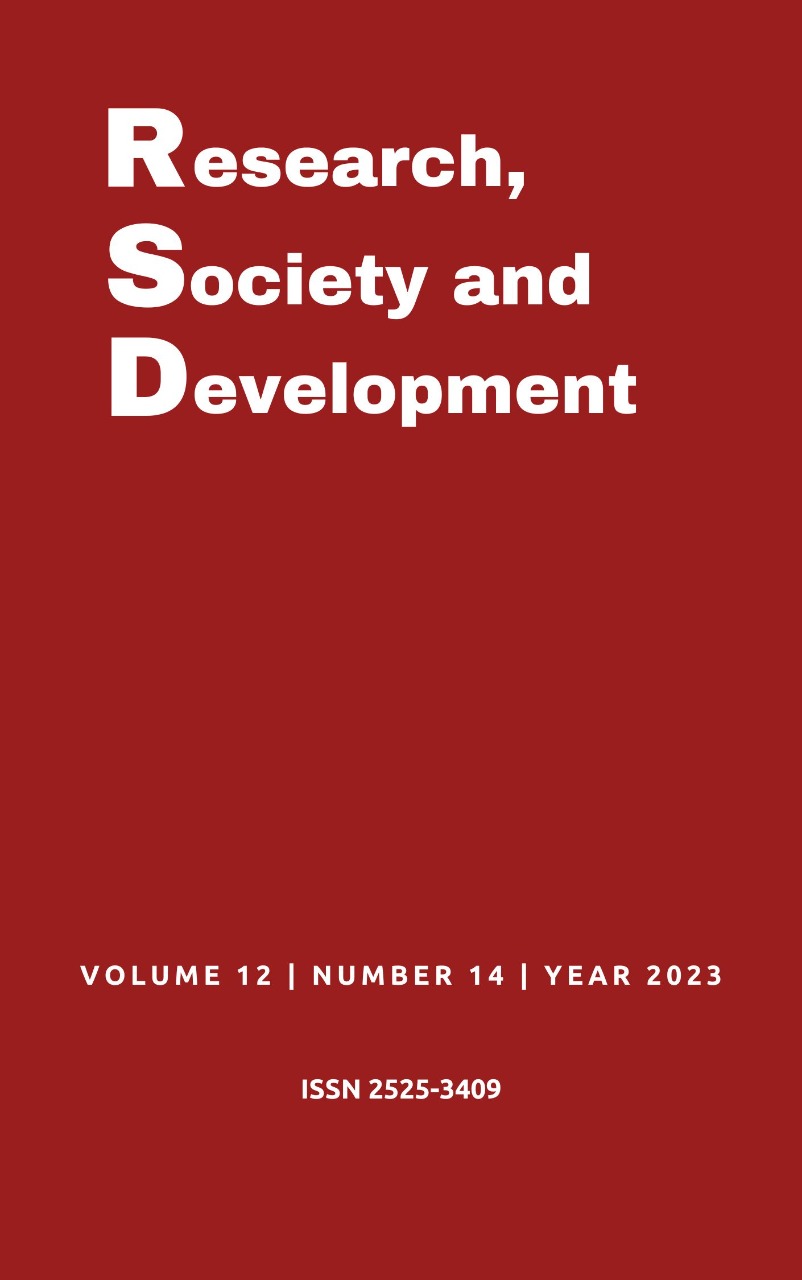Knowledge of nurses about the reception of the LGBTQIAP+ population in the context of primary health care
DOI:
https://doi.org/10.33448/rsd-v12i14.44584Keywords:
Sexual and gender minorities; Nursing; Primary health care.Abstract
Objective: to know the perception of nurses in primary health care about the reception of the LGBTQIAP+ population. Methods: this is a descriptive study conducted with nurses working in the Primary Health Care Units (UAPS) of regional 1 of the city of Fortaleza-CE. Eighteen nurses participated through an electronic questionnaire, during the months of November and December 2021. The collected data were analyzed through thematic categorical analysis. Results: two categories emerged that dealt with the concepts and knowledge of primary care nurses about the LGBTQIAP+ population; and the health policy of the LGBT population and the reception in primary care. Some nurses have limited knowledge about gender, identity and sexual orientation, although they know aspects of health policy and implement host actions in primary care services. Conclusion: there is a knowledge gap about the LGBTQIAP+ population among the surveyed nurses. It is evident the need to implement permanent education actions in order to train nurses in primary health care in the reception of this specific public.
References
Brasil (2013). Secretaria de Atenção à Saúde. Acolhimento à demanda espontânea. Ministério da Saúde. Brasília: DF. https://bvsms.saude.gov.br/bvs/publicacoes/acolhimento_demanda_espontanea_cab28v1.pdf
Brasil (2013). Secretaria de Gestão Estratégica e Participativa. Política Nacional de Saúde Integral de Lésbicas, Gays, Bissexuais, Travestis e Transexuais. Ministério da Saúde. Brasília: DF. https://bvsms.saude.gov.br/bvs/publicacoes/politica_nacional_saude_lesbicas_gays.pdf
Carvalho A. A. de & Barreto R. C. V. (2021). A invisibilidade das pessoas LGBTQIA+ nas bases de dados: novas possibilidades na Pesquisa Nacional de Saúde 2019? Ciênc saúde coletiva, 26(9): 4059–64.
Costa-Val, A., Manganelli, M. S., Moraes, V. M. F de, Cano-Prais, H. A, & Ribeiro, G. M. (2022). O cuidado da população LGBT na perspectiva de profissionais da Atenção Primária à Saúde. Physis, 32 (2):e320207.
Domene, F. M., Silva, J. L, Toma, T. S, Silva, L. A. L. B, et al. (2022). Saúde da população LGBTQIA+: revisão de escopo rápida da produção científica brasileira. Ciênc saúde coletiva, 27(10): 3835–48.
Ferreira, B. O, & Bonan, C. (2021). Vários tons de “não”: relatos de profissionais da Atenção Básica na assistência de lésbicas, gays, bissexuais, travestis e transexuais (LGBTT). Interface (Botucatu), 25:e200327.
Fortaleza, Ceará. (2020). Decreto No. 14.590, de 06 de fevereiro de 2020. https://fortaleza2040.fortaleza.ce.gov.br/foruns-territoriais/assets/documents/DECRETO_N_14.590_DE_06_DE_FEVEREIRO_DE_2020.pdf
Gomes R. (2021). Participação dos movimentos sociais na saúde de gays e lésbicas. Ciênc saúde coletiva, 26 (6): 2291–300.
Guimarães, R. C. P, Lorenzo, C. F. G, & Mendonça, A. V. M. (2010). Sexualidade e estigma na saúde: uma análise da patologização da diversidade sexual nos discursos de profissionais da rede básica. Physis, 31(1):e310128.
Ketzer, N, Vieira, L. V, Schneck, C. A. et al. (2022). Saúde Sexual e Reprodutiva na Atenção Primária à Saúde: relatos de mulheres lésbicas. Rev. baiana enferm. 36.
Machado, D, Brás, M, Almeida, A, & Cordeiro R. (2022). Impacto da revelação da homossexualidade na família: revisão integrativa da literatura. Revista de Investigação & Inovação em Saúde, 5(1), 139–154.
Martins, D. A. B, Preuss, L. T, & Silva, S. C. (2021). Uma análise da Política Nacional de Saúde Integral LGBT à luz do conceito gramsciano de estado ampliado. Revista Crítica de Ciências Sociais, 126: 91-112.
Minayo, M. C. S. (2014). O desafio do conhecimento: pesquisas qualitativa em saúde. São Paulo (SP): Hucitec.
Moreira, E. A. S. & Marcos, C. M. (2019). Breve percurso histórico acerca da transexualidade. Psicol. Rev, 25(2):593-609.
Paranhos, W. R, Willerding, I. A. V, & Lapolli, É. M. (2021). Formação dos profissionais de saúde para o atendimento de LGBTQI+. Interface (Botucatu), 25:e200684.
Rocon, P. C, Sodré, F, Rodrigues, A, et al. (2020). Vidas após a cirurgia de redesignação sexual: sentidos produzidos para gênero e transexualidade. Ciênc saúde coletiva, 25(6): 2347–56.
Santos, J. S, Silva, R. N, & Ferreira, M. A. (2019). Saúde da população LGBTI+ na Atenção Primária à Saúde e a inserção da Enfermagem. Esc Anna Nery, 23(4):e20190162.
Silva, A. C. A, Alcântara, A. M, Oliveira, D. C. et al. (2020). Implementação da Política Nacional de Saúde Integral de Lésbicas, Gays, Bissexuais, Travestis e Transexuais (PNSI LGBT) no Paraná, Brasil. Interface (Botucatu), 24:e190568.
Siqueira, M. D. & Klidzio, D. (2020). Bissexualidade e pansexualidade: identidades monodissidentes no contexto interiorano do Rio Grande do Sul. Revista debates insubmissos, 3(9): 186-217.
Souza, V. R, Marziale, M. H, Silva, G. T, & Nascimento, P. L. (2021). Tradução e validação para a língua portuguesa e avaliação do guia COREQ. Acta Paul Enferm., 34:eAPE02631.
Suliano, D, Irffi, G, & Barreto, A. B. R. S. (2022). Orientação sexual e seus efeitos no mercado de trabalho: um estudo com base na técnica de revisão sistemática. Rev bras estud popul., 39:e0186.
Downloads
Published
How to Cite
Issue
Section
License
Copyright (c) 2023 Marley Gomes de Freitas; Beatriz Oliveira Teixeira; Arisa Nara Saldanha de Almeida; Linicarla Fabíole de Souza Gomes; Juliana Freitas Marques

This work is licensed under a Creative Commons Attribution 4.0 International License.
Authors who publish with this journal agree to the following terms:
1) Authors retain copyright and grant the journal right of first publication with the work simultaneously licensed under a Creative Commons Attribution License that allows others to share the work with an acknowledgement of the work's authorship and initial publication in this journal.
2) Authors are able to enter into separate, additional contractual arrangements for the non-exclusive distribution of the journal's published version of the work (e.g., post it to an institutional repository or publish it in a book), with an acknowledgement of its initial publication in this journal.
3) Authors are permitted and encouraged to post their work online (e.g., in institutional repositories or on their website) prior to and during the submission process, as it can lead to productive exchanges, as well as earlier and greater citation of published work.

